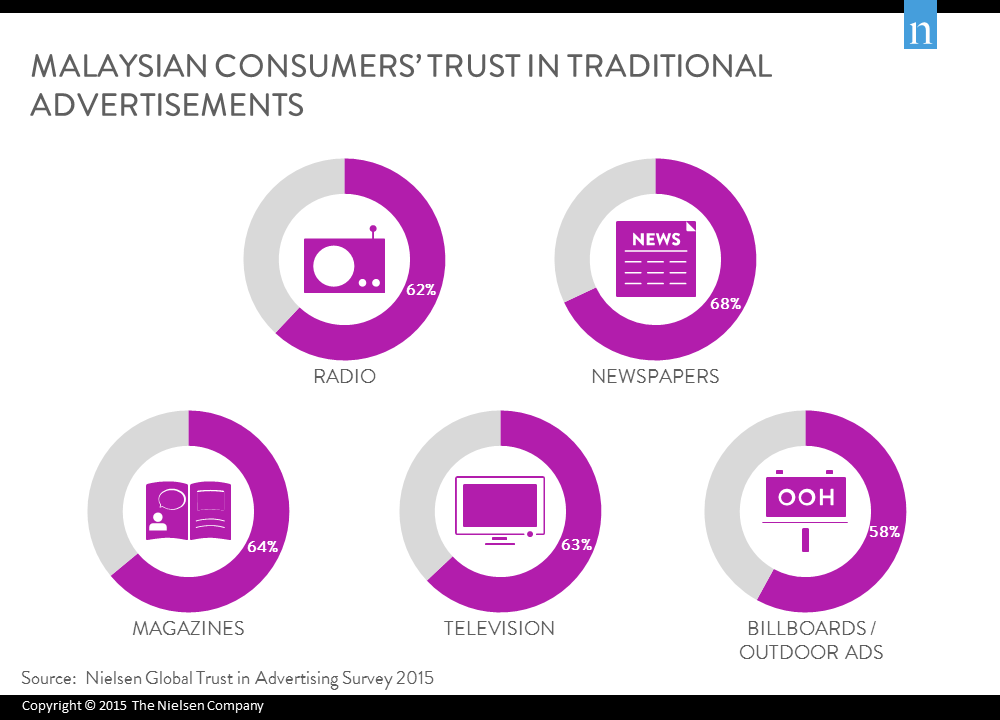While advertising in the form of word-of-mouth recommendations from people they know and trust continue to be the most trusted source of advertising by consumers in Southeast Asia, owned online channels are increasingly finding their way into the consumer’s circle of trust, according to Nielsen’s latest report on Trust in Advertising.
Across Southeast Asia, 88% of consumers placed the highest level of trust in word-of-mouth recommendation from people they know, with Filipino consumers leading the way at 91%. Word-of-mouth endorsements also gathered an increase in approval from Vietnamese (89%), Indonesians (89%), Malaysians (86%), Singaporeans (83%) and Thais (82%),
“Undoubtedly, word-of-mouth recommendations enjoy the biggest trust from consumers and if combined with the power of digital formats, its potency can reach optimum levels,” said Craig Johnson, Nielsen’s Head of Reach Solutions for Southeast Asia, North Asia and Pacific. “Mastering online word-of-mouth marketing techniques can result to quicker and viral reach. Brand marketers can widen the circle of trust of consumers by engaging passionate brand advocates to amplify their message and giving them a compelling rason to talk. Trust is fragile because if trust is broken, your advocates also have the power to damage credibility and reputation.”
TRUST IN TRADITIONAL ADVERTISING LIVES ON
Traditional ad format continue to be among the most trusted forms of paid advertising in Malaysia. More than six in 10 Malaysian consumers indicated their trust in ads published/broadcasted in newspapers (68%), magazines (64%) and television (63%).
“The proliferation of online formats has not eroded trust in traditional (offline) paid channels. TV still delivers the highest unduplicated reach of between 85% and 90%,” notes Johnson. “While digital ads can present consideratble advantages such as prescision-focused campaigns, in-flight adjustments and more creative options, moving from TV to an all-display digital plan is a bold move for any marketers. A concoction of both offline and online channels can yield the best ROI.”

CREDIBILITY OF MOST PAID ONLINE AND MOBILE ADS GETS STRONGER
Among online paid ads, Southeast Asian consumers (87%) put the most trust on served ads in search engine results. Thailand gives the highest trust score (63%) followed by Indonesia (61%), Philippines (56%), Vietnam (55%), Malaysia (46%) and Singapore (46%). The global average of trust on served ads in search engine results is 47%.
The credibility of ads in social networks an online video closely follows. About six in 10 Thais (60%) and Filipinos (56%) say they trust ads delivered through social networks while about five in 10 consumesr in Indonesia (54%), Vietnam (48%), Malaysia (47%) and Singapore (44%) feels the same.
Trust in online video ads recorded an increased in four out of six Southeast Asian countries. In contrast, Malaysia is the only country in the region tha recoded a decline in trust on online video ads (41%).
About two in five Malaysian consumers trust online banner ads (42%) and mobile ads (39%) while a third say they trust text ads on mobile phones (33%) – all below global average of 42% (online banner ads), 43% (mobile ads) and 36% (text ads on mobile phone).
ONLINE FORMATS MAKE IT EASY TO TAKE ACTION
The report also revealed that although trust and action are clearly linked, credibility is not always a pre-requisite to purchase intent. In Malaysia, action exceeds trust across the 19 advertising formats in the survey. Respondents that trust the recommendations of people they know claim they take action on these opinions majority of the time (90% vs. trust at 86%).
Formats which earned lower trust levels can be extremely effective in driving consumers to the point of purchase. This is particularly true for online and mobile formats. in Malaysia, all self-reported action exceeds trust by more than double digits for ads on e-mails that respondents signed up for (71%), social media (66%), ads in search engine results (63%), online video ads (56%), online banner ads (55%), ads on mobile devices (54%) and text ads on mobile phones (49%).
“Online and mobile formats make it easier for consumers to take quick action on the ads,” observed Johnson. “With a click, consumers are directed to a place where they can receive more information or purchase the item.”
ADS THAT MAKE THE GREATEST IMPACT
Advertising that used real-life situations (51%) was the most likely to resonate among Malaysian consumers while ads that are value (49%). family (47%) and health-oriented (43%) also fared well.
“To make a lasting and significant connection with consumers, advertisers need to understand the audience and their preference,”advised Johnson. “Advertisements that feature relatable situations and comedic relief, and those which focus on family, values and health greatly appeal to consumers in Southeast Asia dn urge the most positive responses.”
Insights contained in this article are based on results from the Nielsen Global Trust in Advertising survey.
ABOUT THE NIELSEN GLOBAL SURVEY
The Nielsen Global Survey of Trust in Advertising was conducted between February. 23 and March 13, 2015, and polled more than 30,000 consumers in 60 countries throughout Asia-Pacific, Europe, Latin America, the Middle East, Africa and North America. In Malaysia, the sample size is 513. The sample has quotas based on age and sex for each country based on its Internet users and is weighted to be representative of Internet consumers. It has a margin of error of ±0.6%. This Nielsen survey is based only on the behavior of respondents with online access. Internet penetration rates vary by country. Nielsen uses a minimum reporting standard of 60% Internet penetration or an online population of 10 million for survey inclusion. The Nielsen Global Survey, which includes the Global Consumer Confidence Index, was established in 2005.



